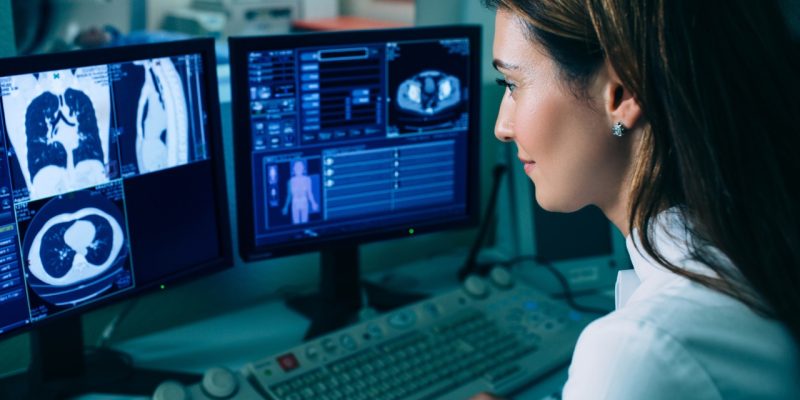Age 50 to 80 years old
(50-77 years old for those with Medicare Part B)
Screenings are vital to catching lung cancer early so that treatment can begin as soon as possible. Lung cancer is the deadliest form of cancer because our lung tissue has no nerves, and symptoms generally do not occur until the cancer has spread. Being an internal organ, we cannot examine the lungs externally, making it difficult to detect lung cancer in its early stages.
The best way to detect lung cancer is through a low-dose CT (LDCT) scan. Unlike chest x-rays, a low-dose CT scan has higher quality imaging for easier detection of abnormalities.

When caught early, lung cancer is highly treatable, between 80%-90%. When the cancer becomes “regional” or spreads into areas surrounding the lungs, 5-year survival rates drop to 37%. When lung cancer is “distant”, meaning it has spread further into the bones or other organs, the 5-year survival rate becomes only 8%.
The compassionate and skilled team at Catholic Health sets us apart from other care options in our region. We offer low-dose CT scans throughout Western New York, and work with your existing primary care team to ensure you receive the quality care you need at a location that is most convenient for you. Scans are noninvasive, painless, and can be completed in about 10 minutes. Patients can usually receive their results within 24-48 hours.
We have access to some of the most sophisticated technology available including robotic-assisted bronchoscopy, a procedure that allows us to diagnose small nodules that would otherwise be difficult to biopsy, leading to earlier diagnosis and faster treatment. Our Thoracic team has also partnered with AstraZeneca, one of the Corporate Associates of the National Lung Cancer Roundtable, to help with initiatives promoting lung cancer screening programs.

Screenings are an insurance covered service and require a script from your primary care physician. Getting screened is quick, easy and could save your life. Let us help you get the process started.
If you meet the above guidelines and are uninsured, please call us at (716) 601-3600 and select option 3.
Lung cancer refers to any type of cancer that starts in the lungs. While other types of lung tumors may occur, there are two main types of lung cancer to be aware of: non-small cell lung cancer (NSCLC) and small cell lung cancer (SCLC).
More people die from lung cancer in the United States than of colon, breast, and prostate cancers combined. This is likely due to the fact that lung cancer can go undetected for a while before people begin to show symptoms. However, the number of lung cancer related deaths has started to decline with fewer people smoking and advances in early detection screening.